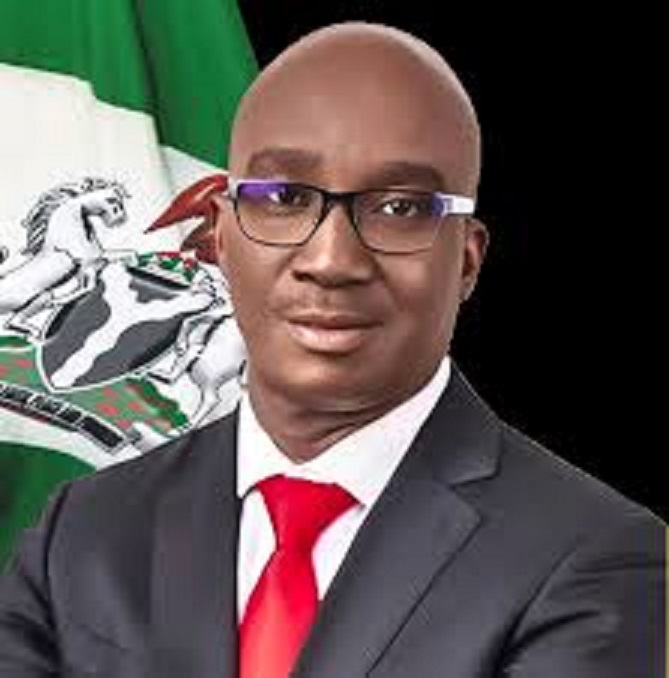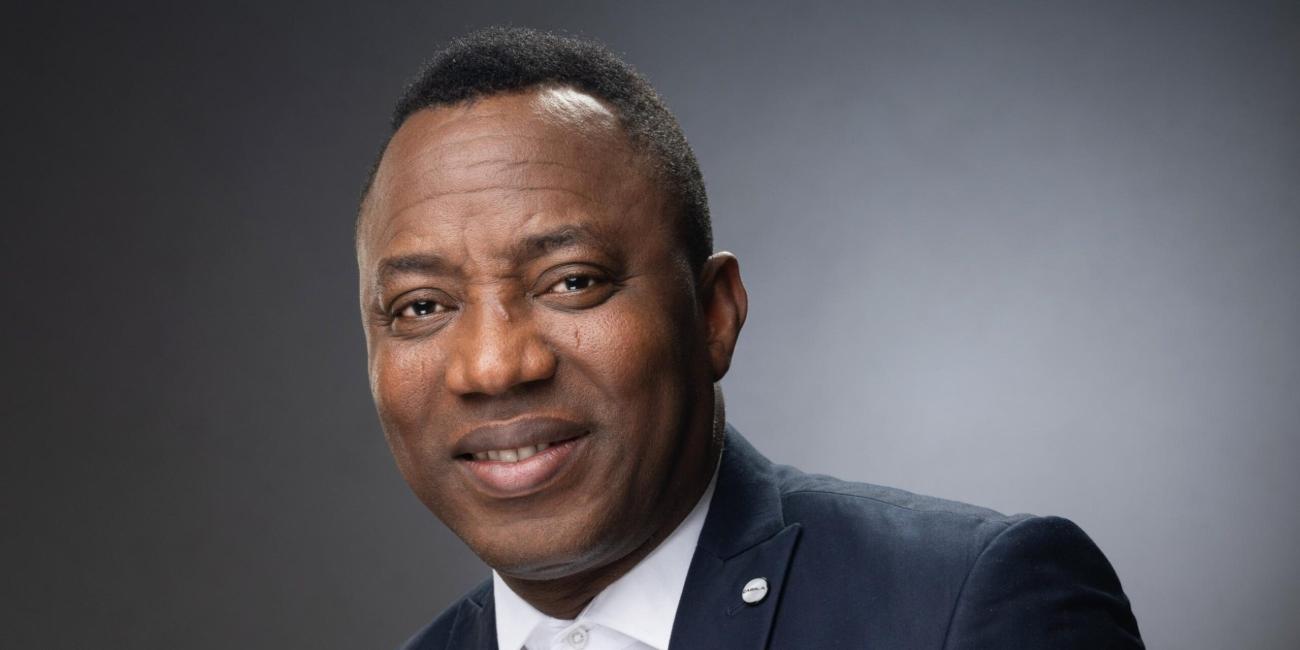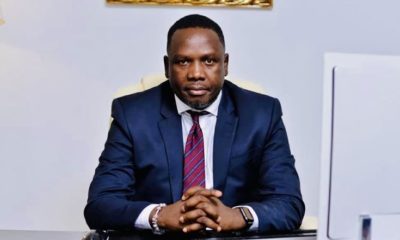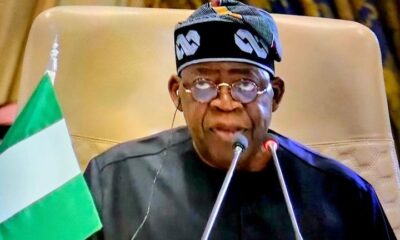Opinion/Feature
Why is Bola Tinubu Hiding in London?

By Farooq A. Kperogi
Questions and concerns over Bola Ahmed Tinubu’s absence from the Nigerian public space, which has trended on Twitter for days on end, are not misplaced or ill-willed gotcha maneuvers by political detractors. They are legitimate expressions of anxieties over the fitness of a man who has the most probable chance to be Nigeria’s president in 2023.
Forget what flawed, poorly designed—and, in some cases, transparently partisan—polls say about the 2023 presidential election. The auguries, for now, favor a Tinubu win next year. Atiku Abubakar and the PDP are mired in an irrecoverably debilitating internal turmoil, and Peter Obi’s wild popularity in the Southeast, the South-South, and some parts of the Christian North is not sufficient to win a presidential election—unless it transcends these regions and leads to actual votes in his favor.
So, heightened apprehensions over Tinubu’s disappearance from public view—and at events where his presence is required— aren’t the idle, bilious indulgences of his haters that his defenders might say they are. They sprout from an acknowledgement that he could be president who will decide the destinies of 200 million Nigerians.
Tinubu was the only presidential candidate who failed to show up in person when presidential candidates of Nigeria’s 18 registered political parties met on Thursday to sign an accord that commits them to a peaceful campaign in the 2023 presidential election. That event was too momentous to miss. Why did Tinubu miss it? What was more important than it, and where is he?
A member of the APC Presidential Campaign Council by the name of Ayo Oyalowo told Arise TV’s Charles Aniagolu that Tinubu is resting in London. “What’s he doing in London? He can’t rest in Lagos,” Oyalowo said. “They will not let him rest. So, he came [sic] into Abuja most of the time. They will still not let him rest. This man has been working for an average of 20 hours in 24 hours in each day. So reasonable people thought, ‘Oga, you need to leave this country because they will not let you rest.’”
This is a curious defense of Tinubu’s self-engineered blackout from public view. Even if it’s true that he needed to take a break from the high-pressure exertions of political campaigns, why did he choose to leave the country on or shortly before an event as important as the signing of a peace accord among presidential candidate, a yearly ritual since 2015 that attracts international media attention? Isn’t that a self-own?
Most importantly, though, if he becomes president, he would be under even more ponderous pressure than he is as a presidential candidate. Is Oyalowo suggesting that a President Tinubu would relocate the Nigerian presidency to London to evade or minimize the perpetual pressures of the presidency?
Which self-respecting patriot who wants to rule his country runs away from it to another country (and a former colonizer’s country, to boot) in moments of pressure? Where else in the world does that happen outside of banana republics?
And why London? Why not, for example, Obudu Ranch in Cross River State or the Yankari Game Reserve in Bauchi State? Or the hills of Iragbiji in Osun State? These are serene, idyllic places in Nigeria whose quietude can restore inner psychic equilibrium and calm frayed nerves. Why do the people who rule or want to rule Nigeria have such deep-seated resentment of and disdain for the country and a corresponding slavish reverence for our former colonizer?
In this, Tinubu is not alone. Even Peter Obi who markets himself, and is touted by his supporters, as “different” from the rest routinely travels to London to “consult” and strategize for the 2023 election—when he is not seeking the endorsement of the same failed old stagers he says he’s different from. He is an Establishment, neocolonial flunkey dressed in borrowed robes.
Atiku Abubakar is no different. He is gripped by the same xenophilic fever that causes our leaders to worship the foreign and despise the nation they want to rule. Dubai is his second—some would say first—home.
But Tinubu is the front runner and the likeliest, for now, to succeed Buhari, far and away Nigeria’s most neocolonial president who finds more comfort in London than he does in Abuja and who has abandoned all pretenses to governance.
In a September 16, 2017 column, I described Buhari as suffering from “Obsessive Compulsive Runawayism,” which I defined as the impulse to desert Nigeria for London, or anywhere else in the West, when the going gets tough, which Tinubu appears to be afflicted by, too.
“This is a president who will leave Nigeria for anywhere at the drop of a hat,” I wrote. “He spent most of 2015 and 2016 traveling the world (for no justifiable reason, in retrospect) and a good bit of [2017] on ‘medical vacation’ in London. So, when he said (or, if you will, joked) that he felt like ‘absconding’ after the enormity of the task he was elected to do stared him in the face, he wasn’t being faithful to the facts. He actually did abscond.” It got even worse after the column was published.
The worries and queries about Tinubu’s frequent habitation in London when he is needed in Nigeria are a direct consequence of our experience with Buhari who has elevated absenteeism, nonchalance, and “ungovernance” to an art.
Nigeria’s problems are too enormous to be additionally burdened with another absent, detached, inelegantly insouciant presidency, which Tinubu’s current attitudes suggest we will have should he become president.
Tinubu and his minders need to come clean about the state of his health. If they insist that he is as fit as a fiddle, they need to tell us why he has been uncommunicative in the last few months.
Communication with the public is a core feature of the American-style presidential democracy we practice in Nigeria. It is public communication that affords the president the opportunity to influence public opinion, to interface with citizens, and to frame and reframe the contours of national conversations.
That is why we now talk of the “rhetorical presidency,” where the goal of presidential communication is no longer to just persuade lawmakers (which is unnecessary in Nigeria since National Assembly members are often pliant yes-men and yes-women) but to win the popular approval of the public. What sort of presidency does Tinubu want to have if he becomes president? A continuation of Buhari? Well, he may not be as lucky as Buhari as been.
After eight years of Buhari’s vacant, dementia-plagued presidency, the last thing Nigeria needs is another presidency that will double down on it, that would be conducted through dishonest press releases by presidential spokespersons, paid social media troll farms, and TV appearances by deviously mercenary mind managers.
Happy Independence Day!
Opinion/Feature
Why Edo PDP Is On Life Support, Gasping For Relevance

Fred Itua
The Edo State Chapter of the Peoples Democratic Party (PDP) has become the political equivalent of a broken-down car, abandoned by its driver after years of reckless driving. It is a shadow of its former self—a factionalized, internally battered, and directionless entity that, instead of seeking redemption, has resorted to aimless wailing against a government that is steadily gaining the trust of the people.
Much like a drowning man flailing in the waters of irrelevance, the PDP is desperately grasping at anything that gives the illusion of political survival. Their latest antics, rather than winning them public sympathy, only reinforce the obvious: Edo PDP is in the Intensive Care Unit (ICU), gasping for air, and rather than battling for survival, they are wasting their dwindling oxygen on unproductive tantrums.
The PDP is not just a sick party on life support—it is a party suffering from terminal political irrelevance. The faction-ridden, scandal-infested remnants of what was once a ruling party has now been reduced to a collection of desperate voices clinging to lies, propaganda, and outright misinformation in a last-ditch effort to remain in public discourse.
It is ironic that the same party that spent the last eight years squandering the State’s resources and alienating its own members now claims to be the voice of reason. The same party that crushed its foundational members—the Legacy PDP—under the weight of impunity and godfatherism is now pretending to be champions of the people. Their newfound role as self-appointed critics of Governor Monday Okpebholo is not driven by patriotism or concern for Edo’s progress; it is nothing more than the desperate growl of a wounded lion that has lost its territory.
Former Governor Godwin Obaseki and his co-travellers were the architects of PDP’s downfall. They ran the party into the ground with their arrogance, side-lining loyal members, imposing candidates, and rewarding opportunists who saw governance as a personal business empire. Now that they have been rejected at the polls and abandoned by the people, their remaining foot soldiers—men like Ogbeide Faluyi Isibor and Chris Nehikhare—have adopted an attack-dog strategy, barking at every single move of the Okpebholo-led Government.
A glaring example of this political misadventure is Chris Nehikhare, a man whose legacy is tainted with corruption, deceit, and an unquenchable thirst for misleading the public. This is the same man who openly admitted to purchasing a government-owned Prado SUV worth N200 million for a laughable N750,000—daylight robbery that epitomizes the reckless looting culture of the PDP era. And yet, with a straight face, he wants to lecture the good people of Edo on accountability and governance. The irony is staggering.
Take, for example, their fabricated outrage over recent security incidents in Ovia and Okpekpe. While the Okpebholo administration swiftly mobilized security forces and initiated immediate responses to curb the threats, PDP shamelessly tried to spin the situation to cover up their own failures. Under their disastrous leadership, Edo’s security architecture collapsed, leaving citizens at the mercy of criminals. Yet, here they are, pretending to care about security only because it offers them another excuse to criticize.
The difference is clear: PDP ignored insecurity for eight years, while Governor Okpebholo has already taken decisive actions, equipping security agencies and restructuring the Edo Security Network. That is the kind of leadership Edo people recognize and respect—not empty rhetoric from disgruntled PDP loyalists who have lost their political feeding bottle.
The PDP’s obsession with baseless accusations extends to their laughable claim that the Okpebholo administration is “inducing” members of the Edo State House of Assembly with ₦200 million each to defect to the APC. This is not only a falsehood; it is a tragic reflection of PDP’s own corrupt mind-set. In their time, they could only buy loyalty with cash because they lacked any real governance achievements to inspire followership. But today, APC is the new bride in Edo, not because of bribery, but because of the people-centred leadership of Governor Okpebholo.
Take Hon. Sunday Ojiezele Ikpenomen, for example. This was a staunch PDP lawmaker who willingly defected to the APC—not because of money, but because he saw the unprecedented developmental strides of the new administration. PDP should stop assuming that every politician shares their old-fashioned, corruption-ridden mentality. Instead, they should focus on fixing their own internal disaster before pointing fingers at a government that is already delivering results.
But here’s the part that baffles the people of Edo: how does a party that wasted eight years of golden opportunity suddenly find the moral audacity to question a government that is barely a few months old?
Governor Monday Okpebholo is not a man of empty words and flamboyant speeches—he is a leader of action. He does not waste time on grandiose promises; instead, he gets to work on real, practical governance. One of his first major projects—the construction of the Rahmat Park Flyover—was welcomed by Edo residents as a long-overdue development. But, as expected, PDP, in its usual tone-deafness, raised a needless alarm, questioning the necessity of the project. The irony is not lost on anyone: this is the same party that promised industrial hubs and economic rejuvenation, only to leave behind white elephant projects that served no real purpose other than enriching a few consultants.
Perhaps the PDP should take a moment to reflect on its own failures before attacking the new government. What became of all the so-called innovation hubs that Obaseki loudly inaugurated? Where are the jobs he promised Edo youths? What happened to the billions allocated for infrastructure that never materialized? Instead of addressing their abysmal record, PDP’s remnants prefer to sit on the side-lines and scream at a government that is busy fixing their mess.
Their latest tactic—flooding the media space with baseless allegations—only proves one thing: they are still reeling from their disgraceful electoral defeat. Having failed to produce any credible argument at the Edo State Election Petition Tribunal, their last resort is to cry foul at every policy of the Okpebholo administration.
But here’s where they miss the point: Edo people are not fooled. They have seen the difference between rhetoric and practical governance. They are witnessing first-hand the commitment of a government that listens, engages, and acts. While PDP’s new poster boys are busy playing opposition for the sake of opposition, Governor Okpebholo is rolling up his sleeves and delivering results.
Governor Monday Okpebholo is not just leading a government; he is leading a rescue mission to recover Edo from the abyss PDP pushed it into. Under PDP, Edo was seen as a State trapped in the hands of political Pharaohs, suffocating under bad governance. But Edo people have now declared they will never go back to Egypt. They have rejected the PDP’s culture of deceit, corruption, and stagnation.
No amount of lies, misinformation, or media outbursts will change the reality: the PDP is politically dead in Edo State. If Chris Nehikhare and his cohorts are so desperate to stay relevant, they should consider writing fiction novels instead of embarrassing themselves with propaganda that even their own party members do not believe.
Make no mistake, Governor Okpebholo welcomes criticism. He has openly stated that even the newly revitalized Edo Broadcasting Service (EBS) should not hesitate to call him out where necessary. But criticism should be based on facts and logic, not bitterness and political frustration. The PDP’s rants are not about governance; they are about wounded egos and lost political privileges.
Edo people have moved on. The future is in the hands of a leadership that prioritizes practical development over political games. The PDP, if it still hopes to be relevant, should abandon its ICU-induced rants and start doing the hard work of genuine opposition—one that offers constructive alternatives rather than desperate, uncoordinated attacks.
Until then, their cries will remain what they are: the last gasps of a party in political coma, struggling to find its place in a State that has outgrown its failures.
Itua, the Chief Press Secretary to the Edo State Governor, wrote from Benin City
Opinion/Feature
Okpebholo’s Unshaken Drive To Recover Edo’s Stolen Assets

By Fred Itua
Wednesday, February 5th, 2025, could best be described as a day of gloom in Edo State, and indeed, our country, Nigeria! It turned out a black Wednesday as mind blogging, heart rending, and unbelievable revelations were brought to light.
Gloomy enough to declare for a state wide mourning, with all residents dressed in sack-cloths, covered in ashes as they mourned the depth of plundering, mind-bogging looting, heartless shady deals, lack of transparency and institutionalisation of corruption by the Godwin Obaseki led administration.
While many often taunted the immediate past administration of Obaseki as an MoU government, known only for rhetorics and no action, not many (if any) would have envisaged or imagined the level of fraud and corruption that took place under his watch as governor of Edo State.
READ ALSO: Adeleke Engages 10,000 Youths For Imole Youth Corps
Submitting its findings contained in 3,900 pages to the incumbent Governor of Edo State, Senator Monday Okpebholo, the Edo State Assets Verification Committee, a body set up on the 26th November, 2024 to assess government’s assets and liabilities, unveiled a can of worms and shady dealings perpetrated by former Gov Obaseki and his cronies that would make any conscientious citizens cringe in holy indignation.
From the reports, one thing became glaring and obvious – Obaseki ran Edo State like a mafia, and his mission resonates with the first part of John 10:10; “to steal, to kill and to destroy”, and that, he did.
Like a ravaging demon, he embarked on a plundering spree, and today, the state bleeds from his satanic kind of looting.
With over 900% increase in the official debt profile of the state (from N84b in November, 2016 to N682b in November, 2024), Obaseki, a self-proclaimed financial expert and economist, made rubbish of his profession with his clear lack of financial discipline, and outrageous financial dealings.
What is even more outrageous and annoying, is the fact that, these monies were borrowed only to be redirected into the pockets of his friends and allies in the name of consultancy, shady deals and inflated projects whose procurement processes were shrouded in secrecy.
His personal company, Afriinvest, and that of his godson, Asue Ighodalo, played prominent roles in this demonic order.
In an unprecedented and very worrisome manner, State funds were used to build structures and infrastructure and handed over to private individuals/companies with no record of financial commitments.
For example, after committing N19b of Edo State taxpayers money in constructing Radisson Hotel, Obaseki’s administration ceded away 80% of the ownership to Tribury House Ltd, a private company registered in 2024 with no single financial commitment to the project.
Within December 2022 and July 2025, Obaseki’s government paid N967 million as consultancy fees to Tanit Engineering to supervise work at the Stella Obasanjo Hospital. Yes, you heard right! N967 million not for the project itself or to purchase equipment but just to supervise work at the hospital. Even more chilling is the revelation that the procurement process in this bid was restricted to only one company – Tanit Engineering…. Who owes Tanit Engineering?
EdoBEST program, which many have now nicknamed, “EdoSCAM” was not spared in this looting spree, as the heartless, looting “general” disguised as an investment banker and technocrat serially raped the state educational sector blind, while gloating in self-deceit as he continually reeled out superfluous claims to the general public. Like one drunk in his own deception and foolishness, Obaseki embezzled the funds meant for EdoBEST, while our children and teachers suffered in harsh learning conditions.
The chilling discovery that Obaseki only remitted $5m out of the $75m released by the World Bank for basic education reforms and renovation of schools to SUBEB is not only nauseating but outright wickedness. Withholding a whopping 93% of funds meant for Edo pupils and students, Obaseki demonstrated an unusual high level of lack of empathy for the Edo child.
It is disheartening that the same man that swore on oath to protect the vulnerable Edo child stole and took that which belonged to the same child.
Time and space would fail me to talk about the many atrocities of the Obaseki-led administration as revealed in the 3,900-page committee’s report.
Is it the dirty racketeering at the demolished iconic Central Hospital valued at N5b, which now houses a private museum whose ownership is shrouded in secrecy despite Edo State Government providing all the funding? Or the road contracts in which kilometers of roads were inflated and contractors paid huge sum of money, negating the procurement laws of the state?
Three months after leaving office, the Edo State Civil servants still develop goosebumps at the mention of the name, “Obaseki”! Using a consultancy firm, Greenfield to run their duties, the civil service was made redundant as “consultants” with no proven track record or work experience, had a field day, running the service as they deem fit. The result of which saw the grounding of the Nigerian Observer, Edo Broadcasting Service, Edo line, and many others.
The circle of corruption continues unabated in Nigeria because there are no consequences for people’s actions and inactions. Many times, those who have taken advantage of their leadership position to steal and abuse offices are given a pat on the back and asked to steal no more. Those who dare to call them out are asked to focus on their own and let bygones be bygones.
In this regard, Edo people sincerely are glad that Governor Monday Okpebholo had the courage and guts to order a probe into the dealings of his predecessor. It is the way to go if sanity must be restored in our public offices. These findings (the report of the asset committee) should be made public so the average Edo citizen sees the extent to which Obaseki raped and defrauded them.
Also, the relevant authorities must step in and carry out a thorough investigation and prosecution. Gone are the days when committee reports are seen merely as academic exercise. This one must and will be different.
Obaseki must unveil the identity of these shady companies he used as cronies, and the balance of $70 million World Bank funds meant for Edo schools must be released. With the volume of revelations contained in the committee’s report, we might just have in our hands a level of looting that would make the notorious Abacha’s looting appear a child’s play.
Obaseki has bitten too much! He has eaten sour grapes, and his teeth must be set on edge. Never again should our children and generations yet unborn suffer because of the uncanny greed and heartlessness of any man.
Itua, the Chief Press Secretary to Edo State Governor, wrote from Benin City, Edo State
Opinion/Feature
Sowore, Egbetokun: Differentiating Between the Law, Emotions, and Cheap Populism

By Olalekan Johnson
In recent times, Omoyele Sowore, the publisher of Sahara Reporters and a former presidential candidate of the African Action Congress (AAC), has been embroiled in a series of unprovoked attacks against the Inspector General of Police (IGP), Kayode Egbetokun.
These attacks have culminated in Sowore’s recent arraignment in court, rightfully raising concerns about his conduct and the potential consequences for both the individual and the larger society.
Sowore has long built his career on harassing, defaming, and undermining the Nigeria Police Force, particularly its leadership. This is not a mere coincidence or an isolated incident, but a pattern of behavior that dates back years.
One of the more recent episodes that illustrate this pattern was when Sowore posted a self-indicting video of himself resisting and obstructing police officers who were merely doing their job in Lagos. This act, alongside others like it, reflects Sowore’s repeated disobedience to lawful orders, cyberstalking, incitement against the police, and, specifically, attacks against the office of the Inspector General of Police.
ALSO READ: BREAKING: NPF Tackles Sowore On Egbetokun’s Tenure
What many fail to realize is that Sowore’s attacks are not just random provocations. They are part of a calculated effort to destabilize the country. His relentless criticism of IGP Egbetokun, who has consistently demonstrated professionalism and adherence to the law, speaks to a larger agenda aimed at creating chaos and eroding the authority of the police force. This is no longer just a case of ideological disagreement, it is a deliberate effort to sow discord and division.
Sowore has long thrived on controversy and has found a niche for himself in the realm of baseless activism, cheap populism, and political blackmail. His actions have always been driven by opportunism, with little regard for the long-term stability of the country. Under the guise of advocating for democracy, Sowore has become synonymous with inciting violence, misleading the public, and promoting himself as a hero of the masses, despite his true motives being rooted in self-interest and a thirst for attention.
While Sowore may have managed to amass a following of blind supporters, it is critical for patriotic citizens to recognize the dangers in his rhetoric. His consistent pattern of false accusations, cyberbullying, and incitement is not just a threat to the Nigeria Police Force, but to the very fabric of society itself. His actions are a direct affront to the rule of law, and should be condemned by anyone who values peace, democracy, and justice.
It is commendable, then, that IGP Egbetokun, despite facing incessant attacks, has opted to pursue legal action against Sowore rather than resorting to violence or intimidation. This response is a testament to the maturity, professionalism, and respect for the rule of law that Egbetokun has consistently displayed in his tenure as the head of the Nigeria Police Force. Under his leadership, the police have shown a firm commitment to upholding justice and ensuring that no one, regardless of their status or influence, is above the law.
Sowore’s behavior illustrates a deep misunderstanding of the purpose of activism. Activism, at its core, should be based on facts, sincerity, and a genuine desire to improve the conditions of the common man. Unfortunately, Sowore has distorted the concept of activism into a tool for personal vendettas, cheap sensationalism, and blackmail journalism. By portraying himself as a champion of the people, he has deceived his followers into believing that he is fighting for justice, when in reality, his actions are self-serving and harmful to the stability of the nation.
Source: Verified handle of the NPF on X





















